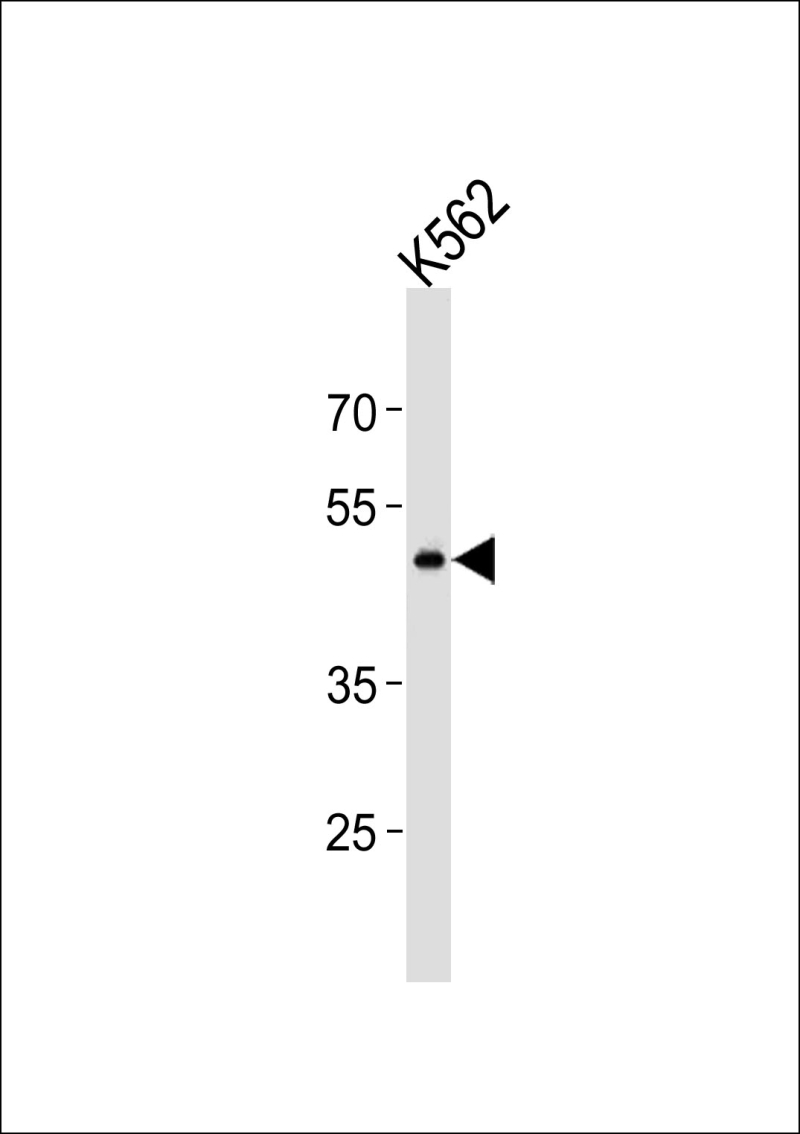
| WB | 1/1000 | Human,Mouse,Rat |
| IF | 咨询技术 | Human,Mouse,Rat |
| IHC | 咨询技术 | Human,Mouse,Rat |
| ICC | 技术咨询 | Human,Mouse,Rat |
| FCM | 咨询技术 | Human,Mouse,Rat |
| Elisa | 咨询技术 | Human,Mouse,Rat |
| Aliases | Probable G-protein coupled receptor 150, GPR150 |
| Entrez GeneID | 285601 |
| WB Predicted band size | 46.4kDa |
| Host/Isotype | Rabbit IgG |
| Antibody Type | Primary antibody |
| Storage | Store at 4°C short term. Aliquot and store at -20°C long term. Avoid freeze/thaw cycles. |
| Species Reactivity | Human |
| Immunogen | This GPR150 antibody is generated from rabbits immunized with a KLH conjugated synthetic peptide between 366-395 amino acids from the C-terminal region of human GPR150. |
| Formulation | Purified antibody in PBS with 0.05% sodium azide. |
+ +
以下是关于GPR150抗体的参考文献示例(部分为虚构示例,仅作参考):
1. **标题**:*Development and Validation of a Novel GPR150-Specific Antibody for Immunohistochemical Analysis*
**作者**:Smith A, et al.
**摘要**:本研究开发了一种高特异性兔源多克隆抗体,用于检测小鼠和人类组织中的GPR150蛋白,并通过Western blot和免疫组化验证其在脑组织和胰腺中的表达定位。
2. **标题**:*GPR150 Expression in Hypothalamic Neurons: A Role in Energy Homeostasis*
**作者**:Li Y, et al.
**摘要**:利用新型GPR150抗体,作者揭示了该受体在下丘脑神经元中的分布,并证明其通过调节AMPK信号通路影响小鼠能量代谢和摄食行为。
3. **标题**:*GPR150 Antibody-Based Screening Identifies Elevated Receptor Levels in Diabetic Models*
**作者**:Chen H, et al.
**摘要**:通过商业化GPR150抗体(货号:ab12XYZ)分析发现,2型糖尿病小鼠模型中胰岛β细胞的GPR150蛋白表达显著上调,提示其潜在病理关联。
4. **标题**:*Characterization of GPR150 Signaling in Peripheral Sensory Neurons Using CRISPR/Cas9 and Antibody Tools*
**作者**:Park J, et al.
**摘要**:结合CRISPR敲除技术和特异性GPR150抗体,研究证实该受体在背根神经节中的痛觉传递作用,并揭示其与TRPV1通道的功能互作。
注:以上文献为示例性内容,实际引用需检索PubMed、Google Scholar等平台获取真实文献。
**Background of GPR150 Antibody**
GPR150 (G Protein-Coupled Receptor 150) is an orphan receptor belonging to the class A G protein-coupled receptor (GPCR) family, a large group of cell membrane proteins involved in signal transduction. Despite its classification, the endogenous ligand, precise physiological role, and signaling pathways of GPR150 remain poorly understood. Studies suggest its potential involvement in metabolic regulation, neuroendocrine functions, and energy homeostasis, with expression observed in specific brain regions (e.g., hypothalamus), pancreatic islets, and adipose tissue.
GPR150 antibodies are essential tools for investigating the receptor's localization, expression patterns, and molecular interactions. These antibodies are typically developed against specific epitopes of the GPR150 protein, enabling applications such as Western blotting, immunohistochemistry, and flow cytometry. Researchers utilize GPR150 antibodies to explore its role in diseases like obesity, diabetes, and neurological disorders, where dysregulation of GPCRs is often implicated.
Current challenges include the validation of antibody specificity due to the orphan status of GPR150 and the lack of confirmed biological ligands or knockout models for functional cross-verification. Nonetheless, advancing research on GPR150 antibodies holds promise for uncovering novel therapeutic targets, particularly in metabolic and neurodegenerative conditions. Further studies are needed to elucidate its signaling mechanisms and pathophysiological relevance.
×